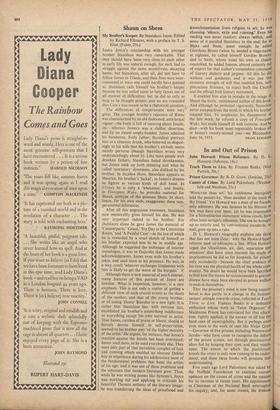Shaun on Shem
My Brother's Keeper. By Stanislaus Joyce. Edited by Richard Ellmann, with a preface by T. S. Eliot. (Faber, 25s.) JAMES JOYCE'S relationship with his younger brother Stanislaus was very remarkable. That they should have been very close to each other in early life was natural enough, for each had to struggle against the same second-rate, decaying home; but Stanislaus, after all, did 'not have to follow James to Trieste, and their lives were inter- connected in ways one could hardly have guessed at. Stanislaus calls himself his brother's keeper because he was called upon to help James out of all manner of difficulties; but he did so only as long as he thought proper, and we are reminded that Cain's was meant to be a rhetorical question .t,
The differences of temperament were very-1 great. The younger brother's rejection of Rome was characterised by an old-fashioned, anticlerical vigour—the book is full of sneering about Jesuits, etc.—whereas James's was a chillier desertion, and by no means empty-handed. James admired his handsome, lively father; Stanislaus portrays him as a tiresome drunk, who behaved so disgust- ingly to his wife that his brother's attitude seems merely perverse (though Stanislaus writes very understandingly about it). Like most people with drunken fathers, Stanislaus hated drunkenness, but James took up both drinking and what he called `scortatory' diversions, also disliked by his brother. In Stephen Hero, Stanislaus appears as Maurice, his brother's `jackal'; in James's dreams he figures as various kinds of dull beast. In Ulysses he is only a 'whetstone'; and finally, in Finnegans Wake, he provides material for Shaun, antitype of the penman Shem. In short, Joyce, for his own ends, exaggerates these tem- peramental differences.
After all this ungracious treatment, Stanislaus now memorably gives himself his due. He was very important indeed to his brother. For Dubliners alone he gave James the material of 'Counterparts,' Grace,"Ivy Day in the Committee Room,' and 'A Painful Case'—in the last of which he is rewarded by a cruel sketch of himself as his brother expected him to be in middle age. Although he suggested the technique of interior monologue, it was to Dujardin .that James made acknowledgments. James even stole his brother's jokes, and used them in his presence. He was, in a way, cruel; 'whoever exchanges kindnesses with him is likely to get the worst of the bargain.' )(
Although there is new material of much interest, many features of this portrait of Joyce are familiar. What is important, however, is a new emphasis. This is not only a matter of getting a different view of such crucial events as the death of the mother, and that of the young brother; or of seeing 'Dante' Riordan in a new light. It is rather that Stanislaus has, with extreme tact, established his brother's astonishing indifference to everything except his own survival as artist. That James, careless of praise or blame, should so fiercely devote himself to self-preservation, seemed to his brother part 'of the higher morality of the artist.' He argues, for instance, that James's reaction against the Jesuits has been overstated; James used them, as he used everybody else. They were only part of that incredible complex of luck and cunning which enabled an obscure Dublin boy to experience during his adolescence most of the fundamental problems that beset the artists of his age; and it was out of these problems and the solutions that modern literature grew. Thus, while he was writing poems like Symons's, Joyce was working out and applying in criticism his beautiful Thomist aesthetic of the literary image; he was transferring the ideas of priesthood and
transubstantiation from religion to art; he was choosing 'silence, exile and cunning.' Even his reading was never random, always 'selfish,' and some of it puzzled Stanislaus to the end; for to Blake and Ibsen, queer enough, he added Giordano Bruno (when he needed a stage-name, at eighteen, he called himself Gordon Brown); and to Swift, whose mind his own so closelY resembled, he added Jonson, almost certainly out of respect for that author's tremendous command of literary dialects and jargons. All this he did without real guidance; and it was just this immense strength of will that enabled him, with precocious firmness, to reject both the Church and the official Irish literary movement. It enabled him also to remake in the image of Shaun the lively, opinionated author of this book. And although he protested vigorously, Stanislaus never escaped from the myth in which his brother trapped him. To emphasise his disapproval of the late work, he refused a copy of Finnegans Wake, but made himself ill with remorse. And he died—with his book most regrettably broken a at James's twenty-second year—on Bloomsday, June 16, 1955. FRANK KERMODO


































 Previous page
Previous page